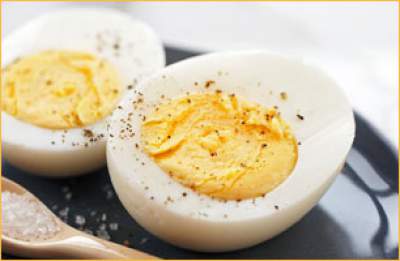How to Hard-Boil Eggs

- Place eggs in saucepan large enough to hold them in single layer. Add cold water to cover eggs by 1 inch. Heat over high heat just to boiling.
- Remove from burner. Cover pan. Let eggs stand in hot water about 12 minutes for large eggs (9 minutes for medium eggs; 15 minutes for extra large).
- Drain immediately and serve warm. OR, cool completely under cold running water or in bowl of ice water, then refrigerate.
Insider Information
- Although the cooking water must come to a full boil in this method, the pan is immediately removed from the heat so that the eggs cook gently in the hot water. This produces tender, not rubbery, eggs and minimizes cracking.
- Banish the greenish ring. This harmless but unsightly discoloration that sometimes forms around hard-boiled yolks results from a reaction between sulfur in the egg white and iron in the yolk. It occurs when eggs have been cooked for too long or at too high a temperature. Our method – cooking eggs in hot, not boiling, water, then cooling immediately – minimizes this.
- Very fresh eggs can be difficult to peel. To ensure easily peeled eggs, buy and refrigerate them a week to 10 days in advance of cooking. This brief "breather" allows the eggs time to take in air, which helps separate the membranes from the shell.
- Hard-boiled eggs are easiest to peel right after cooling. Cooling causes the egg to contract slightly in the shell.
- To peel a hard-boiled egg: Gently tap egg on countertop until shell is finely crackled all over. Roll egg between hands to loosen shell. Starting peeling at large end, holding egg under cold running water to help ease the shell off.
- Storage: In the shell, hard-boiled eggs can be refrigerated safely up to one week. Refrigerate in their original carton to prevent odor absorption. Once peeled, eggs should be eaten that day.
- Food safety precaution: Piercing shells before cooking is not recommended. If not sterile, the piercer or needle can introduce bacteria into the egg. Also, piercing creates hairline cracks in the shell, through which bacteria can enter after cooking.
- Never microwave eggs in shells. Steam builds up too quickly inside and eggs are likely to explode.
- High altitude cooking: It's almost impossible to hard-boil eggs above 10,000 feet.
Attribution
Recipe and photo used with permission from: American Egg Board
Air Fryer ~ American Regional ~ Appetizers ~ Baby Food ~ Back of the Box ~ Beans ~ Beverages ~ Bowls/Buddha Bowls ~ Bread ~ Breakfast/Brunch ~ Camping/Hiking ~ Candy ~ Canning ~ Casseroles ~ Celebrity ~ Condiments ~ Cookies ~ Cooking for a Crowd ~ Cooking for Two ~ Cowboy/Ranch ~ Crock Pot ~ Dessert ~ Diet ~ Energy Bars ~ Family Favorites ~ Fish/Seafood ~ Gifts in a Jar ~ Grill ~ Holidays ~ Home Remedies ~ Instant Pot ~ International ~ Jiffy Mixes ~ LuAnn's Family Favorites ~ Meat ~ Meatless ~ Mixes ~ Name Brand ~ Nutella ~ Packet Cooking ~ Pampered Chef ~ Pasta/Rice/Beans ~ Pet Food ~ Picnic ~ Pizza ~ Potluck ~ Pressure Cooker ~ Restaurant ~ Salads/Salad Dressings ~ Sandwiches ~ Sauces ~ School Cafeteria ~ Seasoning/Flavored Oil/Vinegar ~ Sheet Pan ~ Side Dishes/Veggies ~ Snacks ~ Soup/Stew/Chili ~ Spreads ~ State Fair ~ Syrup ~ Tofu ~ TVP ~ Two-Ingredients ~ Vegetarian ~ Wild Game
Articles ~ Cooks Corner ~ Glossary (Dictionary) ~ Household Hints ~ Kitchen Hints

